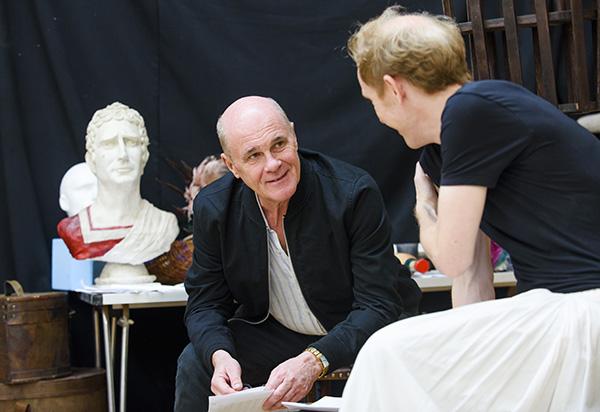If you hope to hold a listener's attention for 37 hours, you'd better capture it at once, and David Rintoul does that. His reading of Thomas Mann's classic novel, in John E. Wood's marvelously fluent translation, is alluring right from the start, but in such a matter-of-fact way that listeners may be enchanted before they know what's happening (click here to listen):
The story of Hans Castorp that we intend to tell here
-- not for his sake (for the reader will come to know
him as a perfectly ordinary, if engaging, young man),
but for the sake of the story itself, which seems to us
to be very much worth telling . . .
Hans Castorp's story is about a visit to see his cousin Joachim at the Berghof Sanatorium, high in the Swiss Alps, which will turn into a stay measured in years, not weeks. Before he's through, every idea in his head will be challenged -- and most of them found wanting. This is a classic German Bildungsroman: the story of a character's moral growth. Yet at times it seems a parody, ironically questioning whether such growth is even possible. Rintoul keeps both sides of that ambiguity alive.
But what makes this audiobook so extraordinary is Rintoul's richly imaginative portrayal of Mann's characters: not just Hans, an engineer-in-training with a curious mind, but the entire international company of patients who come and go at the sanatorium, culminating in Mynheer Peeperkorn, the large-than-life Dutchman whose charisma overwhelms everyone, although he often fails to complete a sentence. The fellow would not be out of place in Dickens.
 |
| David Rintoul and Greg Haiste, preparing for Jessica Swales' Nell Gwynn at the Globe Theatre (Photo: Tristram Kenton) |
Rintoul is just as successful with the narrator, whose cheerfully modest demeanor acts as a foil for Hans' strivings -- both to get well and to make sense of his life and the world around him. Rintoul's delivery is pitch-perfect, as when he addresses the gulf between the pre-war years at the Berghof and the readers of 1924. The narrator informs us that Hans' story "took place back then, long ago, in the old days of the world before the Great War, with whose beginnings so many things began; whose beginnings, it seems, have not yet ceased. But is not the pastness of a story that much more profound, more complete, more like a fairy tale, the tighter it fits up against the 'before'?"
The novel is certainly an enormous canvas, with room for evocative depictions of Alpine scenery alongside Mann's spirited dialogues and the expositions about physiology, which are as expansive as those about whales in Moby Dick. Rinoul has a prodigious ability to adjust his tone, tempo and dynamics for each of these, always keeping Mann's broader concept in view, just as a conductor must do with a Mahler symphony. Every variation is wisely judged.
Those who know the book will relish Rintoul's incarnations of Joachim Ziemßen, Hans' dutiful, soldier cousin; Clawdia Chauchat, the young woman Hans loves; Lodovico Settembrini, who guides his adventures in philosophy; Leo Naptha, who tries to make a Jesuit of him; and Director Behrens, the melancholy surgeon presiding over the Berghof's guests. Newcomers will find that the novel has lost none of its lustre, although readers have been enjoying and pondering Mann's story for nearly a century.
As for me, I'm already halfway through my second listen.
- Thomas Mann on the novel's genesis
- An online video series on the novel in English, German, and Italian
- The Modern Library edition, with an introduction by A.S. Byatt
- Sally McGrane on The Magic Mountain in The New Yorker
- Rodney Symington's reader's guide to the novel
- The model for the Berghof as it is today
- Excerpt from Volker Weidermann's new book about Mann
- An overview of Mann's works by Algis Valiunas
October 4, 2022

.jpeg)


No comments:
Post a Comment
Thanks for your comment. It should appear here shortly.